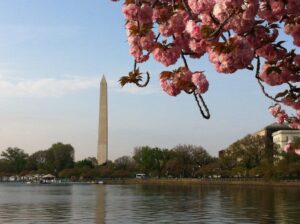Washington D.C. is technically not a state, however in some ways it is treated like one and in others not. The 23rd Amendment gave citizens of the District the right to vote in presidential elections and three votes in the electoral college. However, the District has no voting representation in Congress. It does have tax requirements as well. Regardless, of how the District is treated it is still a part of our country, so for this month we decided to focus on our nation’s Capitol!
Business Climate
With an area that is dominated by United States historical landmarks there’s no surprise that tourism would be a huge staple to the District’s economy. Some of the popular attractions include the Smithsonian Institution, national monuments, and memorials for notable US presidents and previous wars. In 2013, the District had over 19 million visitors and tourism spending reached $6.69 billion. There are over 75,000 people employed within the tourism industry that earn $3.65 billion in wages. The District forecasts that tourism will continue to grow in the upcoming years.
While there are other prominent and growing industries in DC, one of the most obvious ones is the government sector. At the end of 2014, 31% of the total jobs in the District were government related. Some of the biggest federal employers in the area include the Department of Defense, Department of Health and Human Services, and the Department of Justice.
Taxes
According to the Tax Foundation’s 2015 State Business Tax Climate Index the District, although not formally ranked as a state, would theoretically be ranked unfavorably at 45th out of 50. For starters their sales tax is complicated and has various tax rates. Depending on the purchase you could be paying as low as 5.75% (for tangible personal property purchases) or as high as to 18% (for parking a car in a commercial lot). Tourists visiting DC would be subject to a 14.5% sales tax for staying overnight at a hotel/motel and 10% for various items including restaurant meals, takeout food, and rental cars. For the fiscal year ending 2013 the District collected almost $1.1 billion. Although some of these seem like excise taxes they are classified as a sales tax within DC.
Additionally, the District imposes an individual income tax rate that collected $1.6 billion in 2013. The lowest bracket is 4.00% and the highest is 8.95%. There is a flat rate corporate income tax rate of 9.975% and total 2013 collections were $298 million. In the upcoming years, the District’s ranking should improve since several aspects of income tax are being revamped and rates will be reduced (such as corporate income tax being reduced to 8.25% by 2019).
Tax Credits and Incentives
DC Tech Incentives: This program offers tax credits and incentives that can help technology companies gain leverage if they locate or expand to DC. The business must be considered a Qualified High Technology Company (QHTC), meaning they must be organized (maintain an office or be headquartered) in the District, have two or more employees, and at least 51% of the gross revenue earned in the District must be from Internet-related services and sales or an activity related to technology, such as information technology, engineering technology, biotechnology, etc. QHTCs are entitled to tax breaks via exemptions and abatements. Here are a few tax incentive examples:
- Exemption from sales and use tax on certain sales to eligible companies
- Reduction in real property tax
- Exemption from the DC corporate franchise tax for 5 years, then 6% every year afterwards
- Partial exemption from the personal property tax
- Capital gains tax exemption
A QHTC can also earn tax credits for:
- Wages paid to qualified or disadvantaged employees (recipients of Temporary Aid for Needy Families and ex-offenders) for a credit of 50% of wages for the first 24 months of employment and a maximum of $15,000 per year.
- Payments for relocation costs of employees, for companies that move at least two fulltime jobs to the District ($7,500 per employee moving into DC, capped at $1 million per company per year).
Before claiming the credit, technology companies must file a certification with their tax returns to certify that they qualify to be a QHTC.
Random Facts
- Minimum wage in DC must be a dollar higher than the Federal minimum wage.
- It takes 570 gallons of white paint to cover the exterior of the White House.
- Not a single US president has been born in DC.
- In 1973, the wife of an Army Chief of Staff General became concerned because soldiers were being buried alone at the Arlington Cemetery, with no family or friends present at the funeral. From then on, an “Arlington Lady” has always been present at a burial.
- Residents of DC couldn’t vote until
- The Lincoln Memorial has 36 columns. Each one represents the states in the Union at the time of Lincoln’s death.
- Admission to all Smithsonian museums in Washington is free, the Institution is federally funded.




















